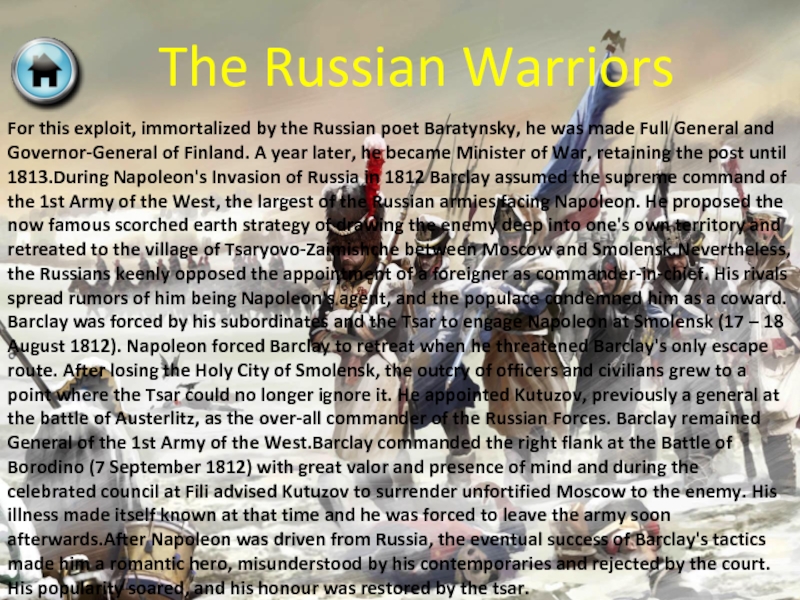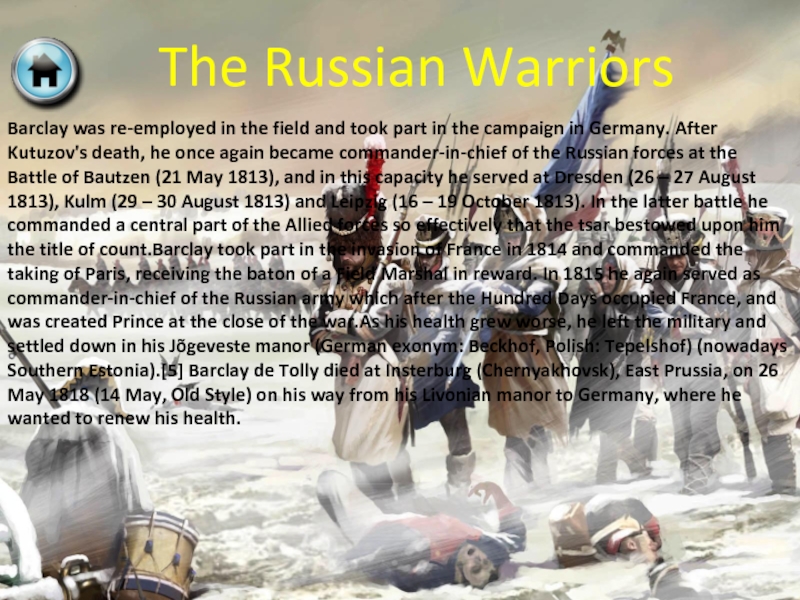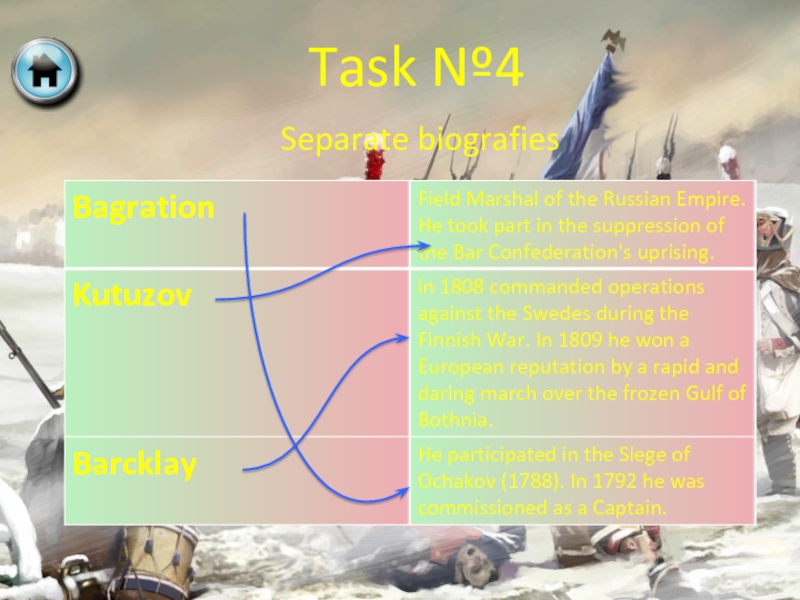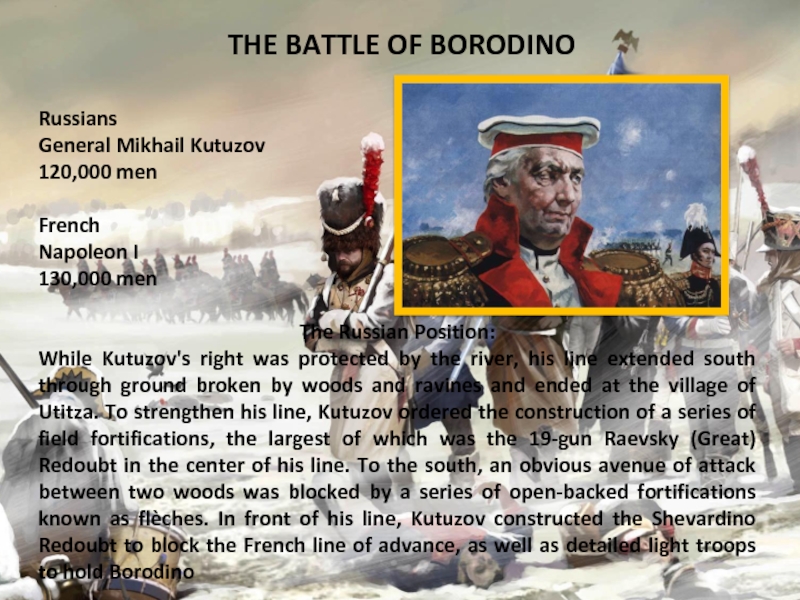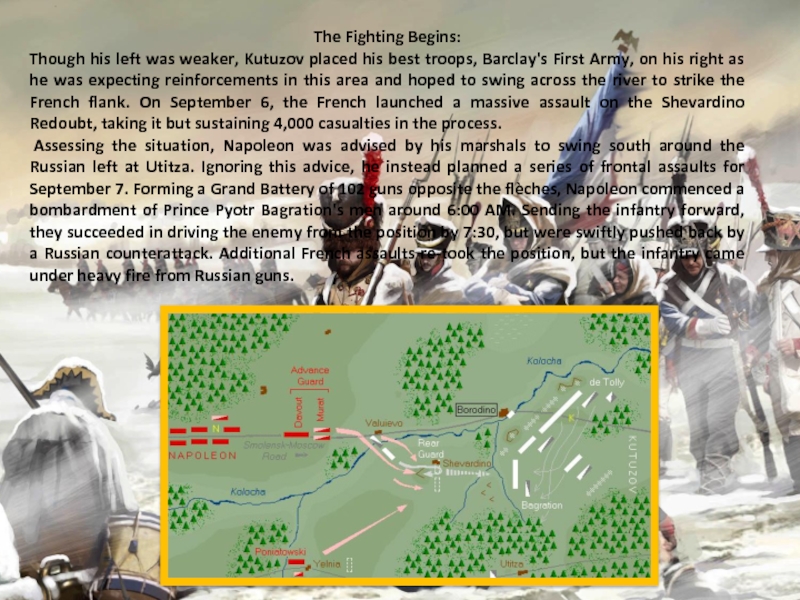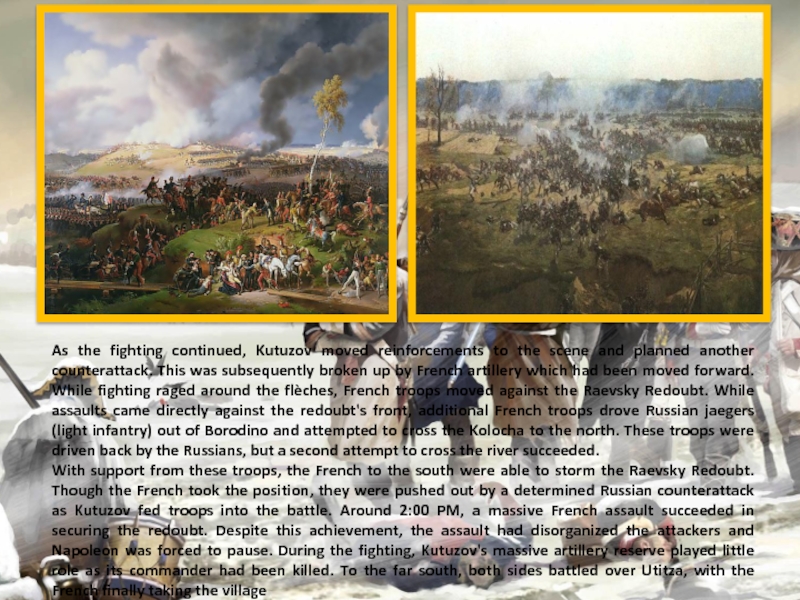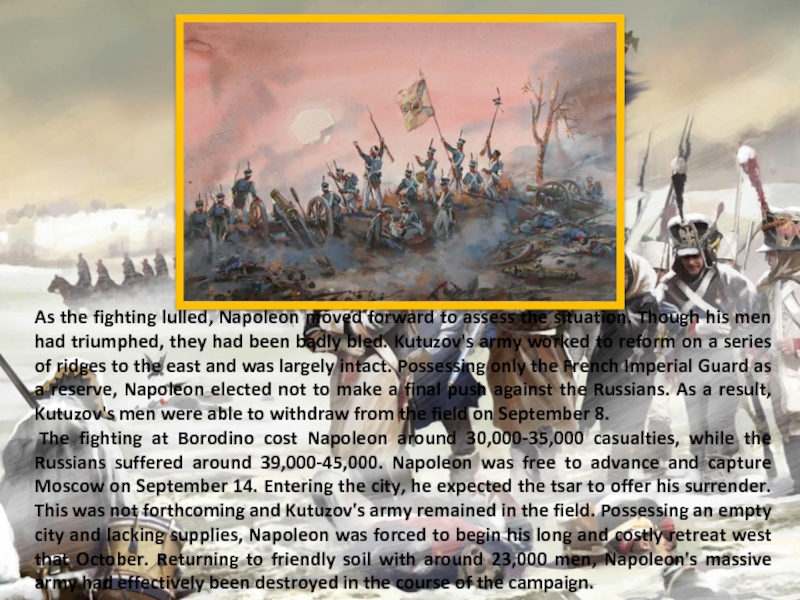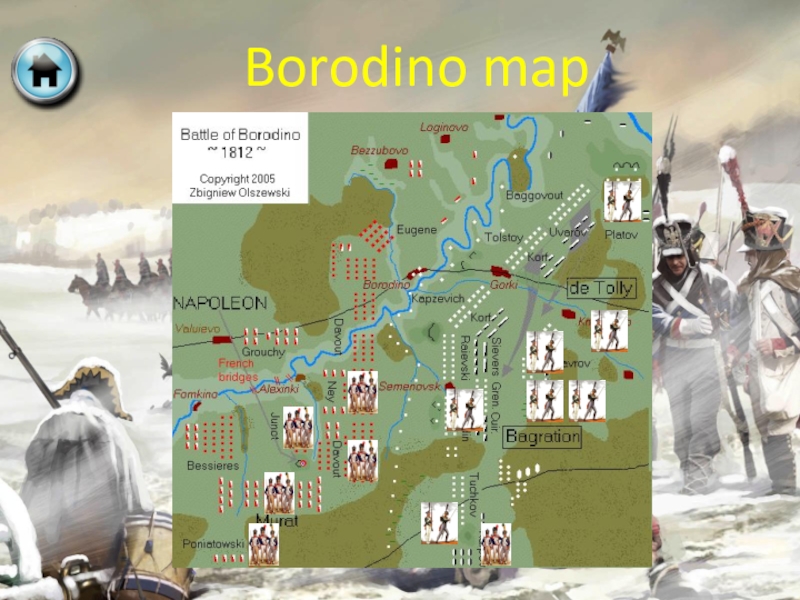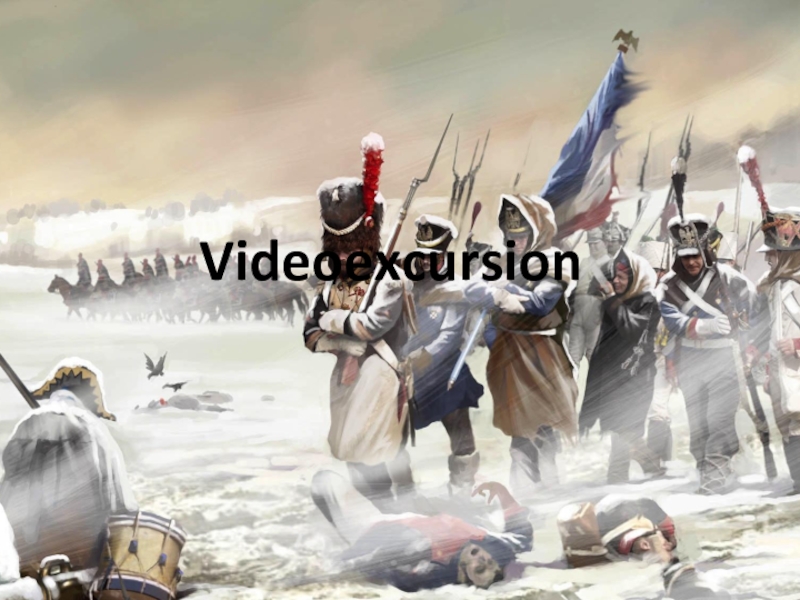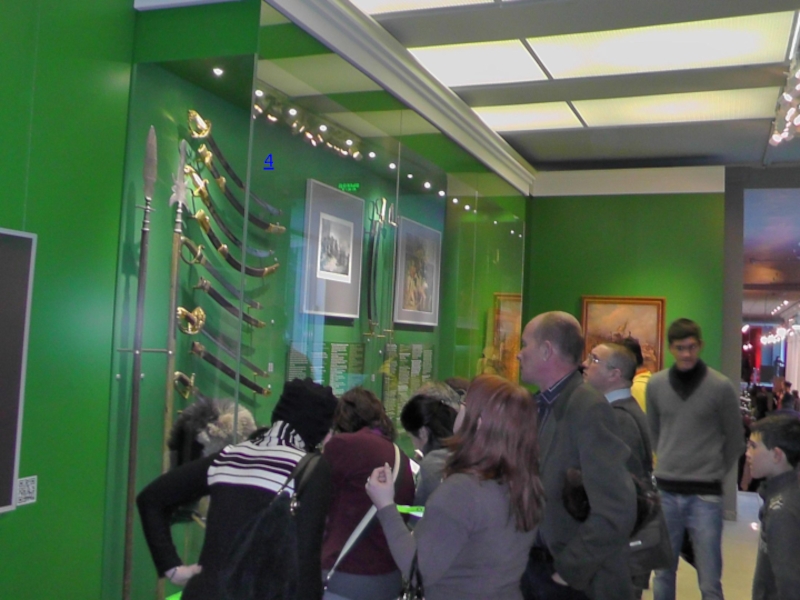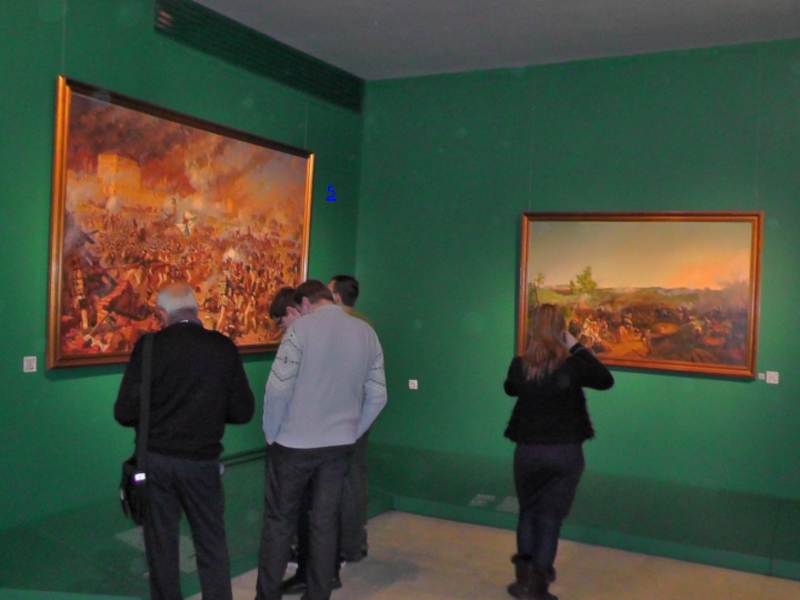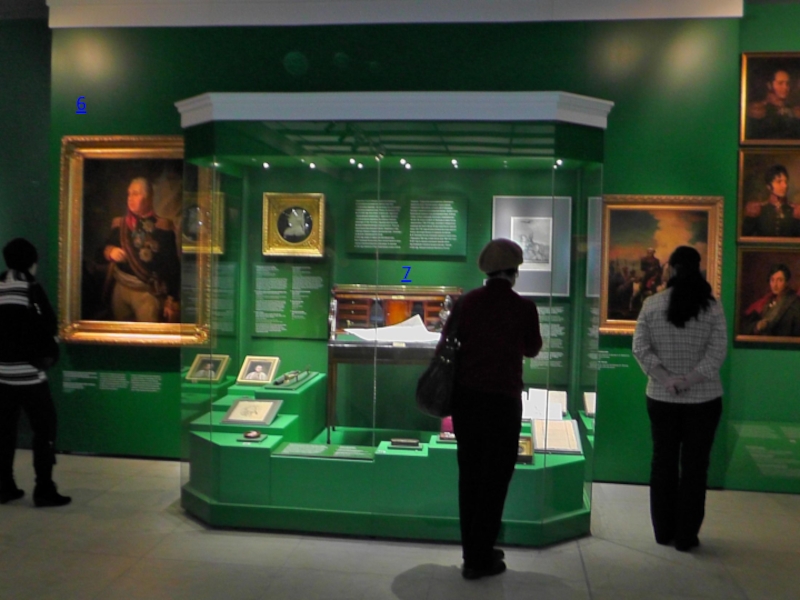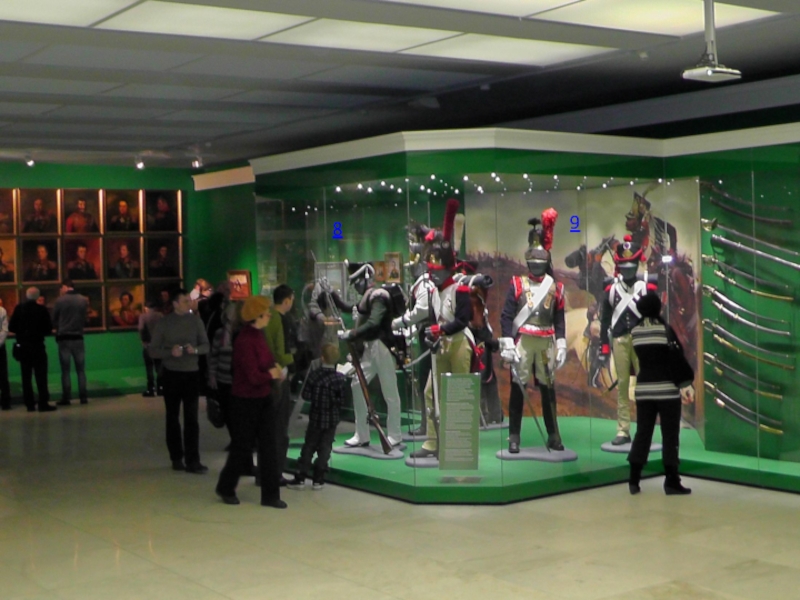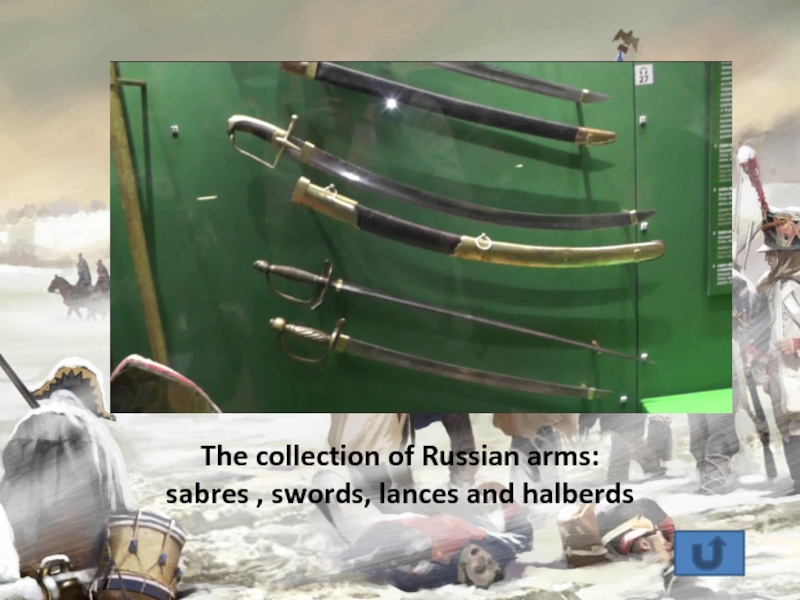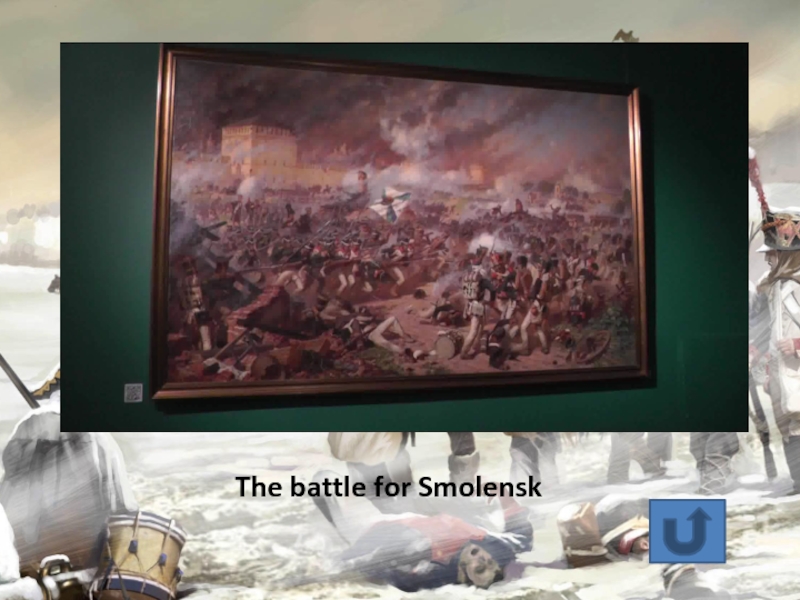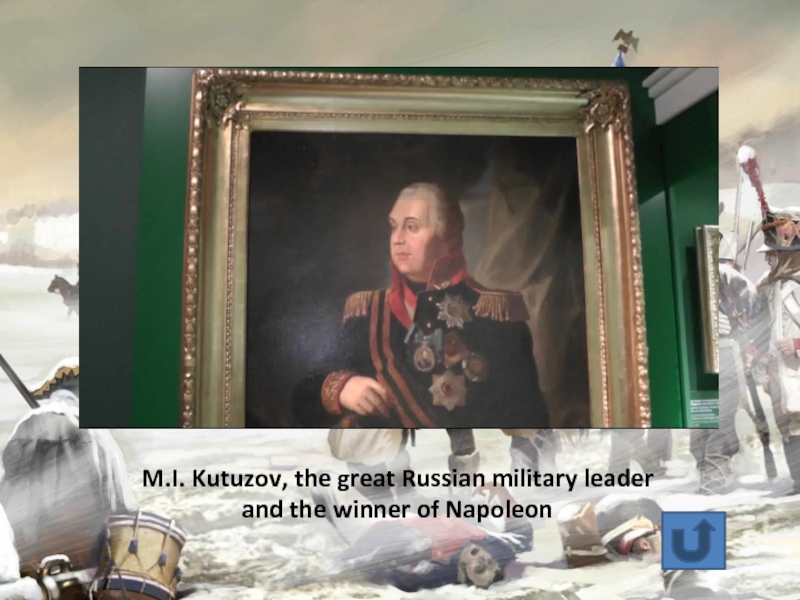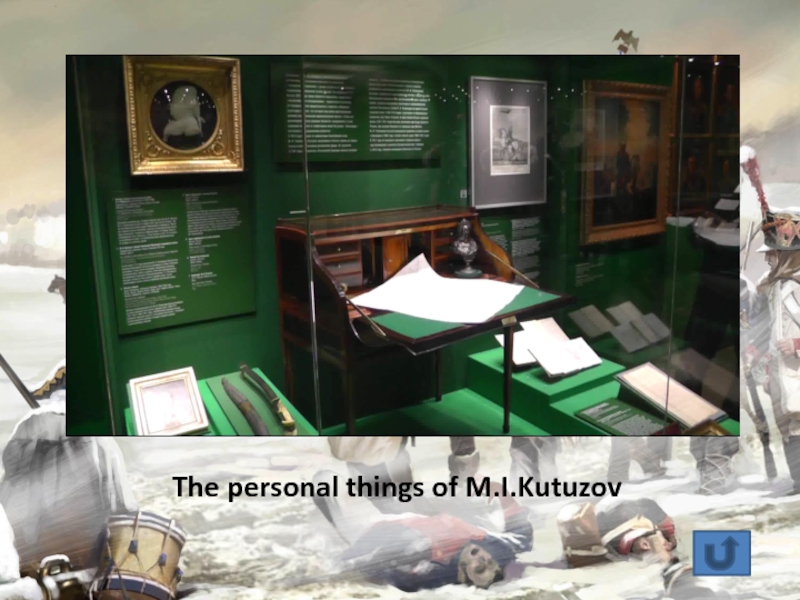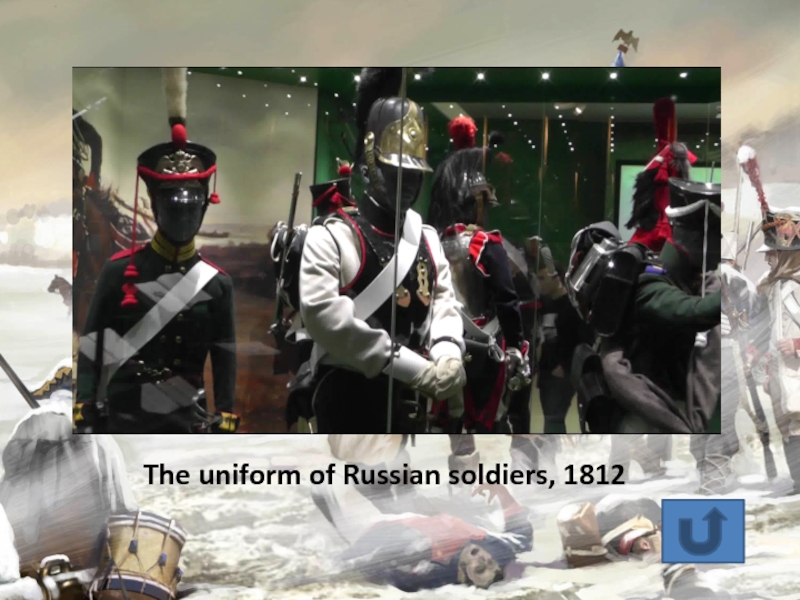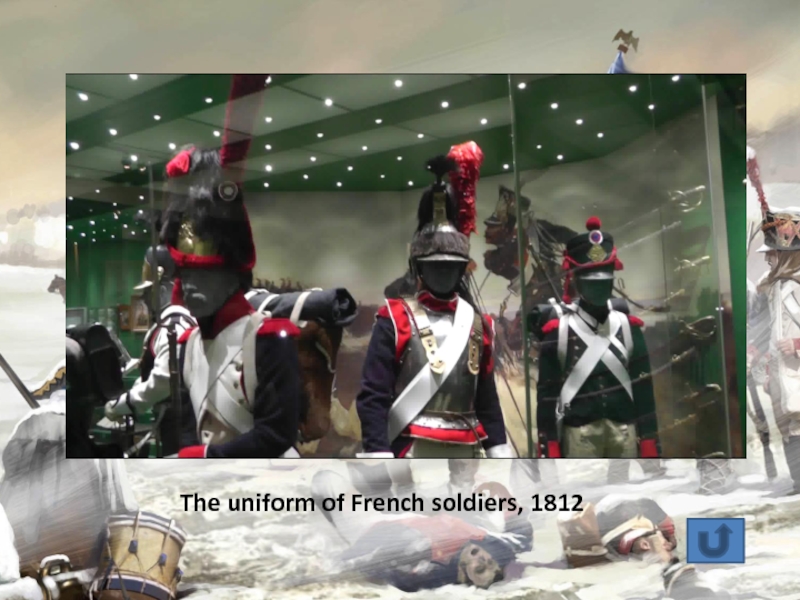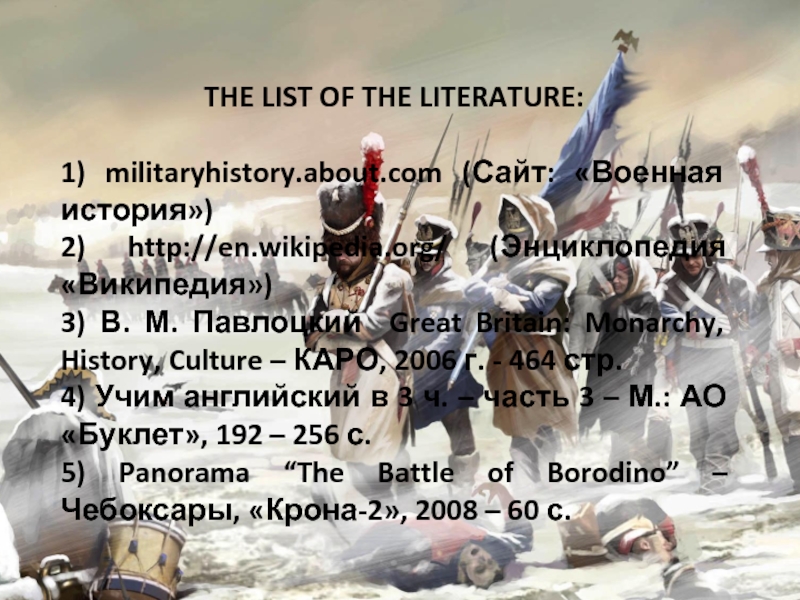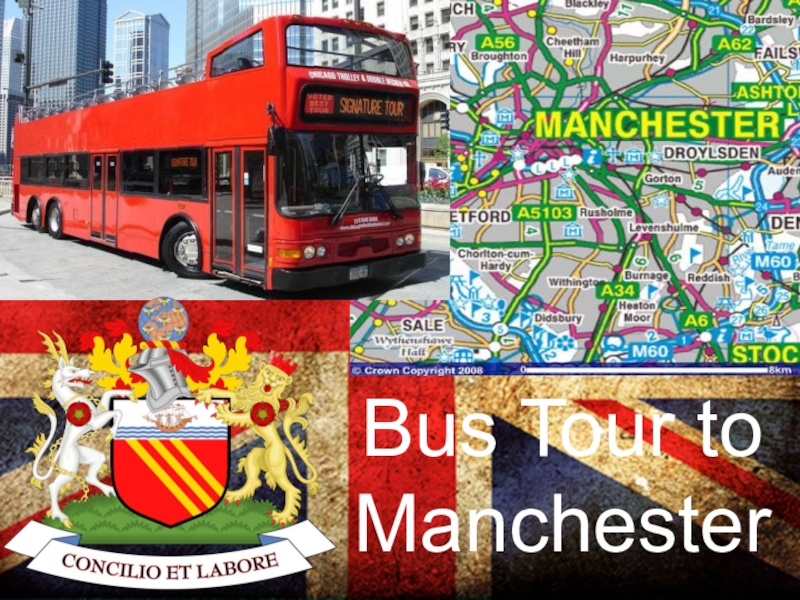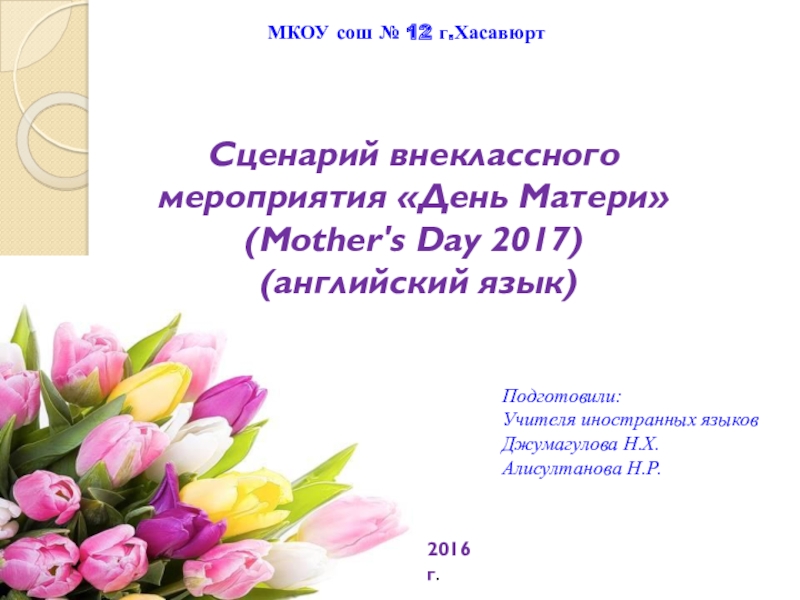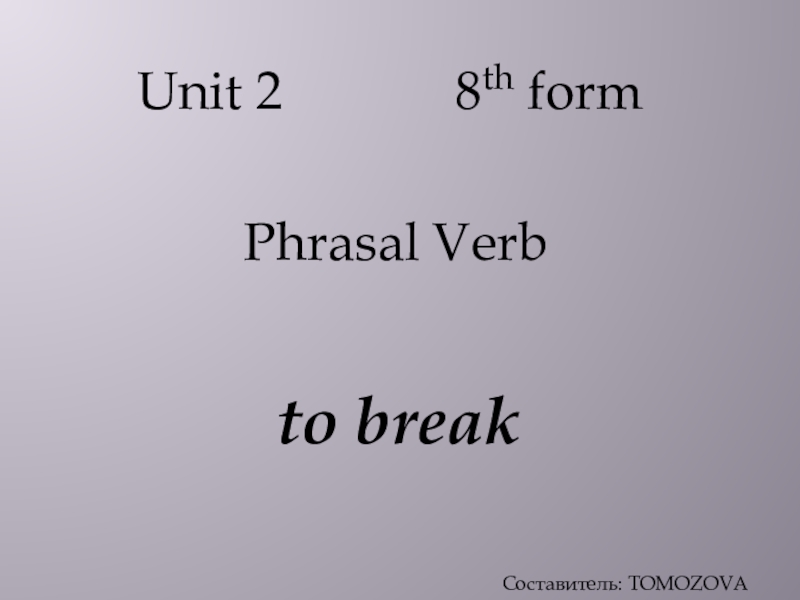- Главная
- Разное
- Образование
- Спорт
- Естествознание
- Природоведение
- Религиоведение
- Французский язык
- Черчение
- Английский язык
- Астрономия
- Алгебра
- Биология
- География
- Геометрия
- Детские презентации
- Информатика
- История
- Литература
- Математика
- Музыка
- МХК
- Немецкий язык
- ОБЖ
- Обществознание
- Окружающий мир
- Педагогика
- Русский язык
- Технология
- Физика
- Философия
- Химия
- Шаблоны, фоны, картинки для презентаций
- Экология
- Экономика
Презентация, доклад на тему Проект: Россия в войне с Наполеоном 1812
Содержание
- 1. Проект: Россия в войне с Наполеоном 1812
- 2. THE PROBLEM OF THE PROJECTThere are few
- 3. THE AIM OF THE PROJECTTo create a
- 4. THE TASKS OF THE PROJECTto find information
- 5. Слайд 5
- 6. Task № 4 BorodinoMap of Borodino
- 7. Alexander I, grandson of Catherine the Great,
- 8. But Russia had one good general, a
- 9. THE RUSSIANS DEFEAT NAPOLEONSo he decided not
- 10. THE RUSSIANS DEFEAT NAPOLEONNapoleon felt
- 11. The freezing cold and snow increased as
- 12. Vocabulary of word comb.
- 13. Vocabulary of word comb.
- 14. Task Nº 1Put in a gap name:The
- 15. Task Nº 1Put in a gap name:The
- 16. Task Nº 2О ком идёт речьThe Russian
- 17. Task Nº 2О ком идёт речьThe Russian
- 18. Task Nº 3
- 19. Task Nº 3
- 20. The Russian WarriorsMikhail Illarionovich Golenishchev-Kutuzov (Russian: князь
- 21. The Russian WarriorsAlexander believed that waiting to
- 22. The Russian WarriorsAlexander believed that waiting to
- 23. The Russian WarriorsBagration was born in 1765
- 24. The Russian WarriorsHis merits were recognized by
- 25. The Russian WarriorsAs a hero of the
- 26. The Russian WarriorsPrince Michael Andreas Barclay de
- 27. The Russian WarriorsFor this exploit, immortalized by
- 28. The Russian WarriorsBarclay was re-employed in the
- 29. Task Nº4
- 30. RussiansGeneral Mikhail Kutuzov 120,000 menFrenchNapoleon I 130,000
- 31. The Fighting Begins:Though his left was weaker,
- 32. As the fighting continued, Kutuzov moved reinforcements
- 33. As the fighting lulled, Napoleon moved forward
- 34. Borodino map
- 35. Videoexcursion
- 36. 4
- 37. 5
- 38. 67
- 39. 89
- 40. The collection of Russian arms:
- 41. The battle for Smolensk
- 42. M.I. Kutuzov, the great Russian military leader and the winner of Napoleon
- 43. The personal things of M.I.Kutuzov
- 44. The uniform of Russian soldiers, 1812
- 45. The uniform of French soldiers, 1812
- 46. THE LIST OF THE LITERATURE: 1) militaryhistory.about.com
THE PROBLEM OF THE PROJECTThere are few materials about the history of our motherland in the English textbooks which we use at our lessons. We’d like to know more English words and word combinations in order
Слайд 2THE PROBLEM OF THE PROJECT
There are few materials about the history
of our motherland in the English textbooks which we use at our lessons. We’d like to know more English words and word combinations in order to prove people from other countries that Russia has rich and interesting history.
In 2012 we celebrated two hundredth jubilee of the Patriotic war, which happened in 1812. It would be a good idea to create a tutorial, in which the facts from different subjects are combined. It will remind our pupils the glorious pages of 1812.
We want to help our teacher of English to make lessons more interesting. We hope that with the help of our presentation pupils will take a more active part in the work at our lessons.
In 2012 we celebrated two hundredth jubilee of the Patriotic war, which happened in 1812. It would be a good idea to create a tutorial, in which the facts from different subjects are combined. It will remind our pupils the glorious pages of 1812.
We want to help our teacher of English to make lessons more interesting. We hope that with the help of our presentation pupils will take a more active part in the work at our lessons.
Слайд 3THE AIM OF THE PROJECT
To create a tutorial about the role
of Russia and England in the wars against Napoleon. This presentation will include:
texts
vocabulary
different tasks, connected with the texts
illustrations
maps
video clips
video excursion
texts
vocabulary
different tasks, connected with the texts
illustrations
maps
video clips
video excursion
Слайд 4THE TASKS OF THE PROJECT
to find information from different sources (books,
the Internet etc.) for making texts
to find illustrations and video clips
to create different tasks (questions, tests etc.), connected with the texts
to create tasks using maps and video materials
to make a video excursion in the museum “The Panorama of Borodino Battle”
to find illustrations and video clips
to create different tasks (questions, tests etc.), connected with the texts
to create tasks using maps and video materials
to make a video excursion in the museum “The Panorama of Borodino Battle”
Слайд 7Alexander I, grandson of Catherine the Great, had never wanted to
be a Tsar. He hated the brutal, prison-like atmosphere of Russia under his father Paul, who treated his people with fierceness and cruelty.In 1801 his father Paul was murdered, and Alexander had to take his place as Tsar. He tried to do away with the things which had made his father so much hated. Also he soon had to turn his attention to war. Napoleon Bonaparte had become Emperor of the French, and was setting to work to make himself master of all Europe. He had conquered Italy, Germany, and Spain, and now he threatened Russia. At first, Napoleon's armies defeated the Russian armies too, and in 1807 Alexander had to sign a peace treaty with Napoleon. But he did not trust him, and he knew that one day Napoleon would try to conquer Russia. This is what happened: 5 years later, in 1812, Napoleon led a huge French army to invade Russia. At first the generals' were not very efficient. By the end of September Napoleon and his army had reached the gates of Moscow.
THE RUSSIANS DEFEAT NAPOLEON
Слайд 8But Russia had one good general, a one-eyed old soldier of
nearly 70, called Mikhail Kutuzov. the Russian people and the Russian army trusted him and insisted that he should become the Commander-in-Chief. Kutuzov knew that army would never be as strong as Napoleon's on the battlefield, and that he must use some other way to defend Russia. Kutuzov knew that the terrible Russian winter would soon begin. The Russians were used to it, but the French soldiers would find the cold hard to bear, especially if they ran short of food and clothing. So he decided not to defend Moscow, and when he left, the city was set on fire. So when the French army reached Moscow, they found that the Russians had just left, and that the great city was in flames. Moscow went on burning for early a month.
THE RUSSIANS DEFEAT NAPOLEON
Слайд 9THE RUSSIANS DEFEAT NAPOLEON
So he decided not to defend Moscow, and
when he left, the city was set on fire. So when the French army reached Moscow, they found that the Russians had just left, and that the great city was in flames. Moscow went on burning for early a month.
Слайд 10THE RUSSIANS DEFEAT NAPOLEON
Napoleon felt sure that
with Moscow in flames, Alexander would surrender, and he sent message after message to Alexander at St. Petersburg. But Alexander had no intention of surrendering to Napoleon. The Russian Cossack regiments surrounded Moscow and would not let any supplies go into the city. The weather got colder and colder until the temperature was well below freezing point, and the French had used up all their supplies. At last Napoleon decided that he must retreat from Moscow.The French retreat from Moscow was one of the most terrible marches that any army has ever made. The French soldiers had plundered silver and gold, furs and carriages, money and jewels; but they had no bread to eat, no horses to carry their plunder, and there were almost no roads. Kutuzov's soldiers followed them closely, attacking them again. Bands of armed peasants helped the soldiers to attack and kill any French stragglers.
Слайд 11The freezing cold and snow increased as the French struggled on
through the empty and deserted countryside. They soon threw away all the rich plunder they had taken from Moscow. When the survivors of the French army at last reached the Russian frontier, only one man in every twelve was still alive.The great Napoleon, the most famous general of his age, was defeated for the first time, and his Grand Army no longer existed. Russia was saved by the determination of the Tsar, the cunning and patience of her great general, Kutuzov, the patriotism and self-sacrifice of her people, and above all, by the bitter cold of her terrible winter. The Russian people used to say that they had one general who could never be conquered: General Frost.
THE RUSSIANS DEFEAT NAPOLEON
Слайд 14Task Nº 1
Put in a gap name:
The great … , the
most famous general of his age, was defeated for the first time, and his Grand Army no longer existed
Alexander 1st
Napoleon
M. Kutuzov
Alexander 1st
Napoleon
M. Kutuzov
Слайд 15Task Nº 1
Put in a gap name:
The great … , the
most famous general of his age, was defeated for the first time, and his Grand Army no longer existed
Alexander 1st
Napoleon
M. Kutuzov
Alexander 1st
Napoleon
M. Kutuzov
Слайд 16Task Nº 2
О ком идёт речь
The Russian people used to say
that they had one general, who could be never conguered: General Frost.
Alexander 1st
Napoleon
M. Kutuzov
Alexander 1st
Napoleon
M. Kutuzov
Слайд 17Task Nº 2
О ком идёт речь
The Russian people used to say
that they had one general, who could be never conguered: General Frost.
Alexander 1st
Napoleon
M. Kutuzov
Alexander 1st
Napoleon
M. Kutuzov
Слайд 20The Russian Warriors
Mikhail Illarionovich Golenishchev-Kutuzov (Russian: князь Михаи́л Илларио́нович Голени́щев-Куту́зов; 16
September [O.S. 5 September] 1745 – 28 April [O.S. 16 April] 1813) was a Field Marshal of the Russian Empire. He served as one of the finest military officers and diplomats of Russia under the reign of three Romanov Tsars: Catherine II, Paul I and Alexander I. He took part in the suppression of the Bar Confederation's uprising, in three of the Russo-Turkish Wars and in the Napoleonic War, including two major battles at Austerlitz and the battle of Borodino.[2]In 1805 Kutuzov commanded the Russian corps which opposed Napoleon's advance on Vienna.On the eve of Austerlitz, Kutuzov tried to convince the Allied generals of the necessity of waiting for reinforcements before facing Napoleon.
Слайд 21The Russian Warriors
Alexander believed that waiting to engage Napoleon’s forces would
be seen as cowardly. Kutuzov quickly realized that he no longer had any power with Alexander and the Austrian chief of staff General-Major Franz von Weyrother. When he asked Alexander where he planned to move a unit of troops, he was told “That’s none of your business.”[11] Kutuzov pretended to sleep throughout the battle planning session as he feared that Alexander would blame him for the inevitable defeat. Kutuzov was present at the battle of Austerlitz on 2 December 1805. Though Alexander’s orders made it clear that the Russians should move off of the strategic Pratzen Plateau, Kutuzov stalled for as long as possible as he recognized the advantage that Napoleon would gain from this high ground. Finally, Alexander forced Kutuzov to abandon the Plateau. Napoleon quickly seized the ridge and broke the Allied lines with his artillery which now commanded the battlefield from the Pratzen Plateau. The battle was lost, and over 25,000 Russians were killed. Kutuzov was put in charge of organizing the army’s retreat across Hungary and back into Russia as Alexander was overcome by grief.
Слайд 22The Russian Warriors
Alexander believed that waiting to engage Napoleon’s forces would
be seen as cowardly. Kutuzov quickly realized that he no longer had any power with Alexander and the Austrian chief of staff General-Major Franz von Weyrother. When he asked Alexander where he planned to move a unit of troops, he was told “That’s none of your business.”[11] Kutuzov pretended to sleep throughout the battle planning session as he feared that Alexander would blame him for the inevitable defeat. Kutuzov was present at the battle of Austerlitz on 2 December 1805. Though Alexander’s orders made it clear that the Russians should move off of the strategic Pratzen Plateau, Kutuzov stalled for as long as possible as he recognized the advantage that Napoleon would gain from this high ground. Finally, Alexander forced Kutuzov to abandon the Plateau. Napoleon quickly seized the ridge and broke the Allied lines with his artillery which now commanded the battlefield from the Pratzen Plateau. The battle was lost, and over 25,000 Russians were killed. Kutuzov was put in charge of organizing the army’s retreat across Hungary and back into Russia as Alexander was overcome by grief.
Слайд 23The Russian Warriors
Bagration was born in 1765 to a Georgian prince
of the Bagratid dynasty, Colonel Prince Ivan Alexandrovich Bagration (18 November 1730 – 9 October 1795), who was the eldest son of Alexander. His brother Roman (Revaz) Bagrationi (1778–1834) was also a general of the Russian army. Bagration entered the Russian army as a sergeant in the Kavsansk Rifles, Astrakhan Infantry Regiment in 1782, beginning a thirty year career in the Russian Army, and served for some years in the Russian-Circassian War. He participated in the Siege of Ochakov (1788). In 1792 he was commissioned as a Captain and transferred to the Kiev Cavalry Regiment that year as a second Major, transferring as a full first Major to the Sofiiskii Carabineers on 15 May 1794. He served in the military campaign to suppress the Polish Kościuszko Uprising of 1794.He received successive promotions to Lieutenant-Colonel (26 October 1794), to Colonel (1798) and to Major-General (1799).
Слайд 24The Russian Warriors
His merits were recognized by Suvorov, whom he accompanied
in the Italian and Swiss campaign of 1799, winning particular distinction by the capture of the town of Brescia. From 1798 to 1799, he commanded the 6th Chasseurs.He commanded the Chasseurs of the Imperial Guard from 1801–1802, serving as GOC Jager Brigade (1802–05) and as the commander of the advance guard at Austerlitz in 1805.[1]In the wars of 1805 Bagration's achievements appeared even more brilliant. With a small rearguard he successfully resisted the repeated attacks of forces five times his own numbers at the Battle of Hollabrunn (1805), and though half his men fell, the retreat of the main army under Kutuzov was thereby secured. At Austerlitz (2 December 1805) Bagration fought against the left wing of the French army commanded by Murat and Lannes. He was promoted to Lieutenant-General in 1805, and fought bravely and obstinately at the battles of Eylau (7 February 1807), Heilsberg (11 June 1807) and Friedland (14 June 1807).
Слайд 25The Russian Warriors
As a hero of the Napoleonic Wars he returned
to St. Petersburg, to become the lover of Catherine, the sister of the tsar, Alexander I. A marriage was out of the question. He then married another Catherine, a relative of Prince Potemkin. She, however, soon left her husband for an interesting life as a salon hostess in Vienna (and sometime mistress of Metternich).[2]During the Finnish Campaign of 1808, by a daring march across the frozen Gulf of Finland, Bagration captured the Åland Islands, and in 1809 he led the Russian army against the Turks at the battles of Rassowa and Tataritza. In 1809 he was promoted to full General of Infantry.[2]In 1812, Bagration commanded the 2nd army of the West, and a few days before Napoleon's invasion on 24 June he suggested to Alexander I a pre-emptive strike into the Duchy of Warsaw. Though defeated at Mogilev (23 July 1812), Bagration led his forces to join the 1st army at Smolensk under Barclay de Tolly, to whom he ceded overall command of both armies on 2 August. Bagration led the left wing at the Battle of Borodino (7 September 1812), where he constructed a number of flèches- due to a shortage of engineer officers though, these were poorly designed. During the battle he received a mortal wound and later died on 24 September, in the village of Simi, which belonged to his aunt. It is said that, while wounded, Bagration kept giving orders to the troops without knowing that the Russian army was abandoning Moscow. When he finally heard the truth, Bagration was so shocked that he rapidly stood up, totally forgetting about his grave wound. Such an act was too much for his severely wounded body and it quickly cost Bagration his life.
Слайд 26The Russian Warriors
Prince Michael Andreas Barclay de Tolly (27 December [O.S.
16 December] 1761 – 26 May [O.S. 14 May] 1818; In Russian: Mikhail Bogdanovich Barklay-de-Tolli Cyrillic: Михаи́л Богда́нович Баркла́й-де-То́лли), was a Russian Field Marshal and Minister of War during Napoleon's invasion in 1812 and War of the Sixth Coalition.In the war of 1806 against Napoleon, Barclay took a distinguished part in the Battle of Pultusk (December 1806) and was wounded at the Battle of Eylau (7 February 1807), where his conduct won him promotion to the rank of lieutenant-general.After a period of convalescence, Barclay returned to the army and in 1808 commanded operations against the Swedes during the Finnish War. In 1809 he won a European reputation by a rapid and daring march over the frozen Gulf of Bothnia, which allowed him to surprise the enemy and seize Umeå in Sweden
Слайд 27The Russian Warriors
For this exploit, immortalized by the Russian poet Baratynsky,
he was made Full General and Governor-General of Finland. A year later, he became Minister of War, retaining the post until 1813.During Napoleon's Invasion of Russia in 1812 Barclay assumed the supreme command of the 1st Army of the West, the largest of the Russian armies facing Napoleon. He proposed the now famous scorched earth strategy of drawing the enemy deep into one's own territory and retreated to the village of Tsaryovo-Zaimishche between Moscow and Smolensk.Nevertheless, the Russians keenly opposed the appointment of a foreigner as commander-in-chief. His rivals spread rumors of him being Napoleon's agent, and the populace condemned him as a coward. Barclay was forced by his subordinates and the Tsar to engage Napoleon at Smolensk (17 – 18 August 1812). Napoleon forced Barclay to retreat when he threatened Barclay's only escape route. After losing the Holy City of Smolensk, the outcry of officers and civilians grew to a point where the Tsar could no longer ignore it. He appointed Kutuzov, previously a general at the battle of Austerlitz, as the over-all commander of the Russian Forces. Barclay remained General of the 1st Army of the West.Barclay commanded the right flank at the Battle of Borodino (7 September 1812) with great valor and presence of mind and during the celebrated council at Fili advised Kutuzov to surrender unfortified Moscow to the enemy. His illness made itself known at that time and he was forced to leave the army soon afterwards.After Napoleon was driven from Russia, the eventual success of Barclay's tactics made him a romantic hero, misunderstood by his contemporaries and rejected by the court. His popularity soared, and his honour was restored by the tsar.
Слайд 28The Russian Warriors
Barclay was re-employed in the field and took part
in the campaign in Germany. After Kutuzov's death, he once again became commander-in-chief of the Russian forces at the Battle of Bautzen (21 May 1813), and in this capacity he served at Dresden (26 – 27 August 1813), Kulm (29 – 30 August 1813) and Leipzig (16 – 19 October 1813). In the latter battle he commanded a central part of the Allied forces so effectively that the tsar bestowed upon him the title of count.Barclay took part in the invasion of France in 1814 and commanded the taking of Paris, receiving the baton of a Field Marshal in reward. In 1815 he again served as commander-in-chief of the Russian army which after the Hundred Days occupied France, and was created Prince at the close of the war.As his health grew worse, he left the military and settled down in his Jõgeveste manor (German exonym: Beckhof, Polish: Tepelshof) (nowadays Southern Estonia).[5] Barclay de Tolly died at Insterburg (Chernyakhovsk), East Prussia, on 26 May 1818 (14 May, Old Style) on his way from his Livonian manor to Germany, where he wanted to renew his health.
Слайд 30
Russians
General Mikhail Kutuzov
120,000 men
French
Napoleon I
130,000 men
The Russian Position:
While Kutuzov's
right was protected by the river, his line extended south through ground broken by woods and ravines and ended at the village of Utitza. To strengthen his line, Kutuzov ordered the construction of a series of field fortifications, the largest of which was the 19-gun Raevsky (Great) Redoubt in the center of his line. To the south, an obvious avenue of attack between two woods was blocked by a series of open-backed fortifications known as flèches. In front of his line, Kutuzov constructed the Shevardino Redoubt to block the French line of advance, as well as detailed light troops to hold Borodino
THE BATTLE OF BORODINO
Слайд 31The Fighting Begins:
Though his left was weaker, Kutuzov placed his best
troops, Barclay's First Army, on his right as he was expecting reinforcements in this area and hoped to swing across the river to strike the French flank. On September 6, the French launched a massive assault on the Shevardino Redoubt, taking it but sustaining 4,000 casualties in the process.
Assessing the situation, Napoleon was advised by his marshals to swing south around the Russian left at Utitza. Ignoring this advice, he instead planned a series of frontal assaults for September 7. Forming a Grand Battery of 102 guns opposite the flèches, Napoleon commenced a bombardment of Prince Pyotr Bagration's men around 6:00 AM. Sending the infantry forward, they succeeded in driving the enemy from the position by 7:30, but were swiftly pushed back by a Russian counterattack. Additional French assaults re-took the position, but the infantry came under heavy fire from Russian guns.
Assessing the situation, Napoleon was advised by his marshals to swing south around the Russian left at Utitza. Ignoring this advice, he instead planned a series of frontal assaults for September 7. Forming a Grand Battery of 102 guns opposite the flèches, Napoleon commenced a bombardment of Prince Pyotr Bagration's men around 6:00 AM. Sending the infantry forward, they succeeded in driving the enemy from the position by 7:30, but were swiftly pushed back by a Russian counterattack. Additional French assaults re-took the position, but the infantry came under heavy fire from Russian guns.
Слайд 32As the fighting continued, Kutuzov moved reinforcements to the scene and
planned another counterattack. This was subsequently broken up by French artillery which had been moved forward. While fighting raged around the flèches, French troops moved against the Raevsky Redoubt. While assaults came directly against the redoubt's front, additional French troops drove Russian jaegers (light infantry) out of Borodino and attempted to cross the Kolocha to the north. These troops were driven back by the Russians, but a second attempt to cross the river succeeded.
With support from these troops, the French to the south were able to storm the Raevsky Redoubt. Though the French took the position, they were pushed out by a determined Russian counterattack as Kutuzov fed troops into the battle. Around 2:00 PM, a massive French assault succeeded in securing the redoubt. Despite this achievement, the assault had disorganized the attackers and Napoleon was forced to pause. During the fighting, Kutuzov's massive artillery reserve played little role as its commander had been killed. To the far south, both sides battled over Utitza, with the French finally taking the village
With support from these troops, the French to the south were able to storm the Raevsky Redoubt. Though the French took the position, they were pushed out by a determined Russian counterattack as Kutuzov fed troops into the battle. Around 2:00 PM, a massive French assault succeeded in securing the redoubt. Despite this achievement, the assault had disorganized the attackers and Napoleon was forced to pause. During the fighting, Kutuzov's massive artillery reserve played little role as its commander had been killed. To the far south, both sides battled over Utitza, with the French finally taking the village
Слайд 33
As the fighting lulled, Napoleon moved forward to assess the situation.
Though his men had triumphed, they had been badly bled. Kutuzov's army worked to reform on a series of ridges to the east and was largely intact. Possessing only the French Imperial Guard as a reserve, Napoleon elected not to make a final push against the Russians. As a result, Kutuzov's men were able to withdraw from the field on September 8.
The fighting at Borodino cost Napoleon around 30,000-35,000 casualties, while the Russians suffered around 39,000-45,000. Napoleon was free to advance and capture Moscow on September 14. Entering the city, he expected the tsar to offer his surrender. This was not forthcoming and Kutuzov's army remained in the field. Possessing an empty city and lacking supplies, Napoleon was forced to begin his long and costly retreat west that October. Returning to friendly soil with around 23,000 men, Napoleon's massive army had effectively been destroyed in the course of the campaign.
The fighting at Borodino cost Napoleon around 30,000-35,000 casualties, while the Russians suffered around 39,000-45,000. Napoleon was free to advance and capture Moscow on September 14. Entering the city, he expected the tsar to offer his surrender. This was not forthcoming and Kutuzov's army remained in the field. Possessing an empty city and lacking supplies, Napoleon was forced to begin his long and costly retreat west that October. Returning to friendly soil with around 23,000 men, Napoleon's massive army had effectively been destroyed in the course of the campaign.
Слайд 46THE LIST OF THE LITERATURE:
1) militaryhistory.about.com (Сайт: «Военная история»)
2) http://en.wikipedia.org/
(Энциклопедия «Википедия»)
3) В. М. Павлоцкий Great Britain: Monarchy, History, Culture – КАРО, 2006 г. - 464 стр.
4) Учим английский в 3 ч. – часть 3 – М.: АО «Буклет», 192 – 256 с.
5) Panorama “The Battle of Borodino” – Чебоксары, «Крона-2», 2008 – 60 с.
3) В. М. Павлоцкий Great Britain: Monarchy, History, Culture – КАРО, 2006 г. - 464 стр.
4) Учим английский в 3 ч. – часть 3 – М.: АО «Буклет», 192 – 256 с.
5) Panorama “The Battle of Borodino” – Чебоксары, «Крона-2», 2008 – 60 с.
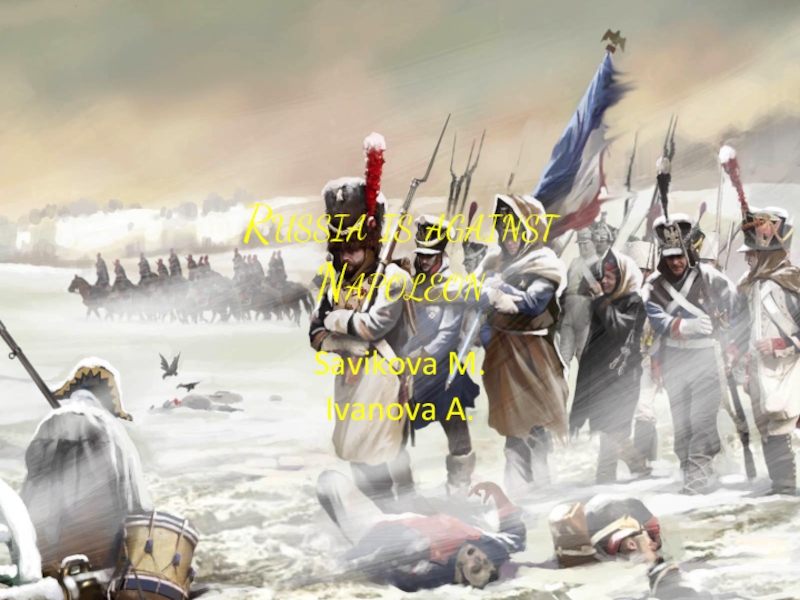

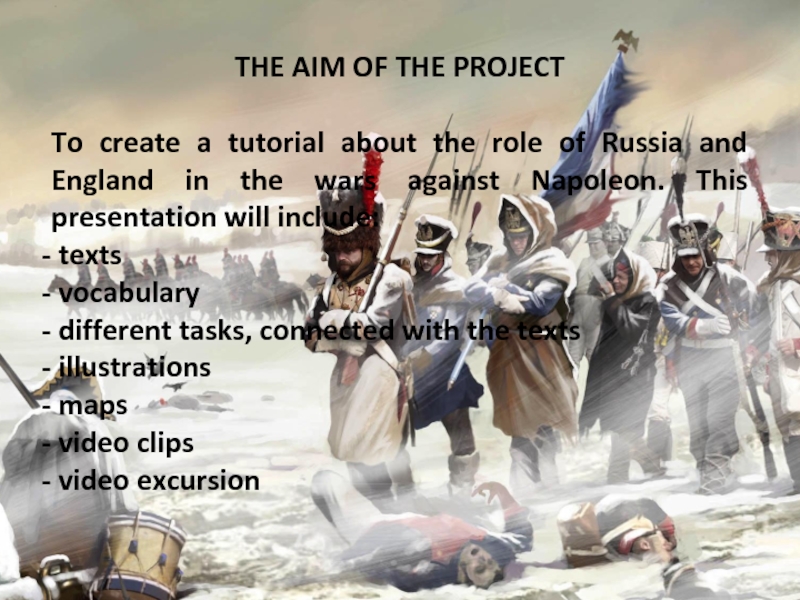
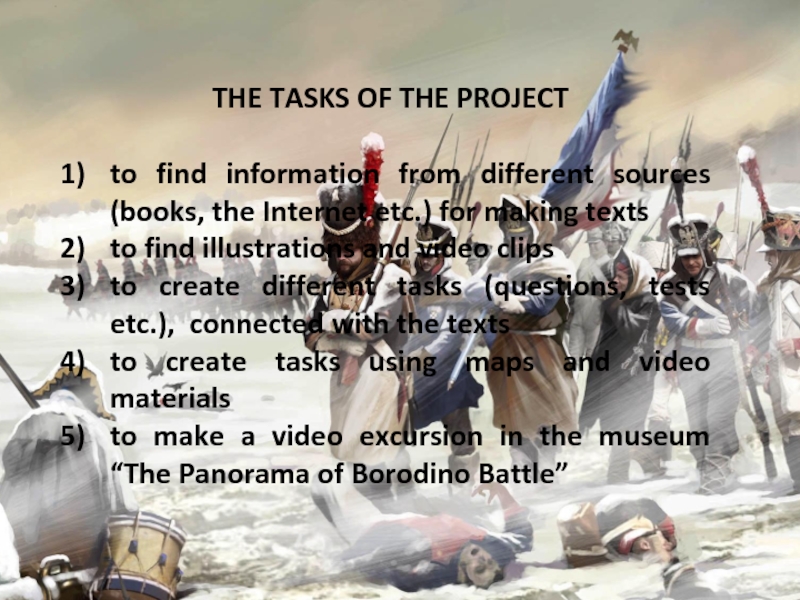
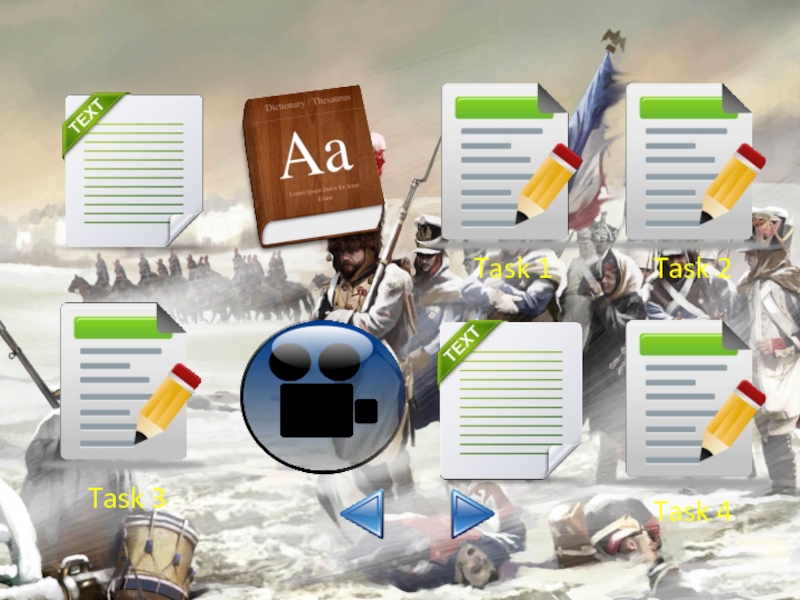
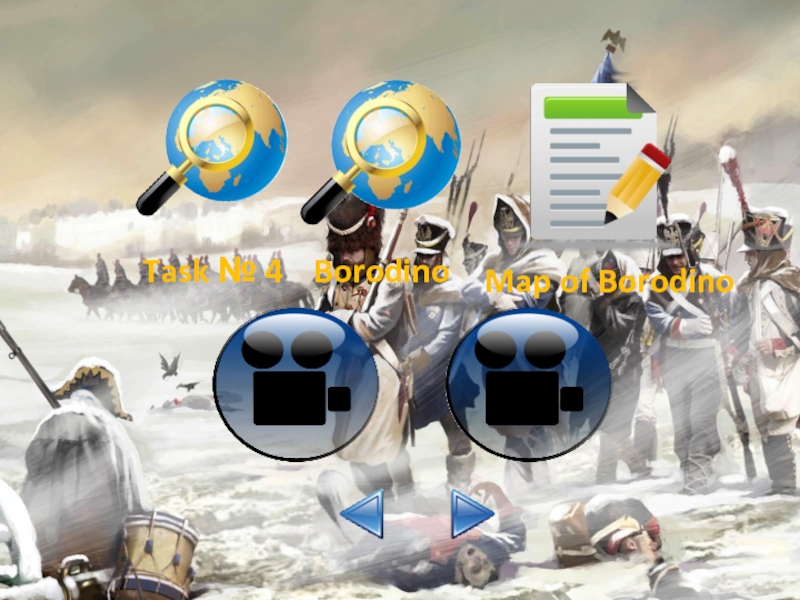
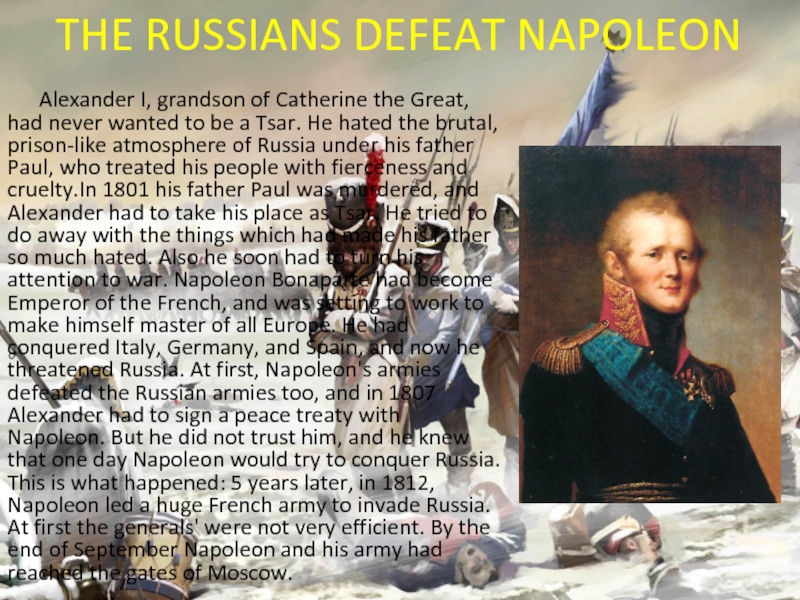
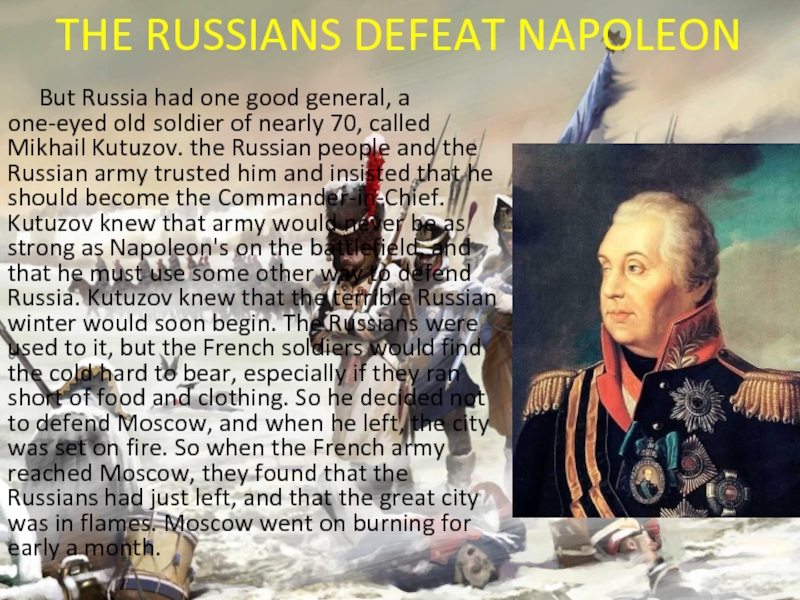
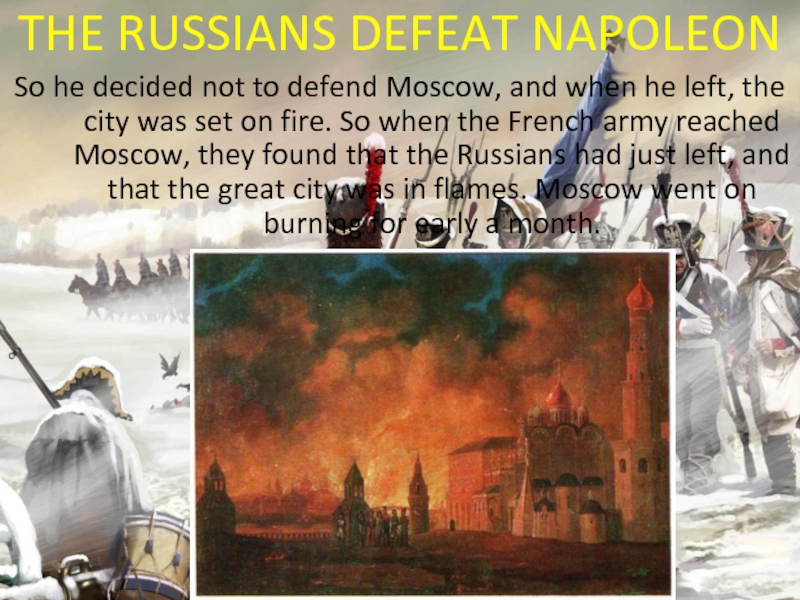
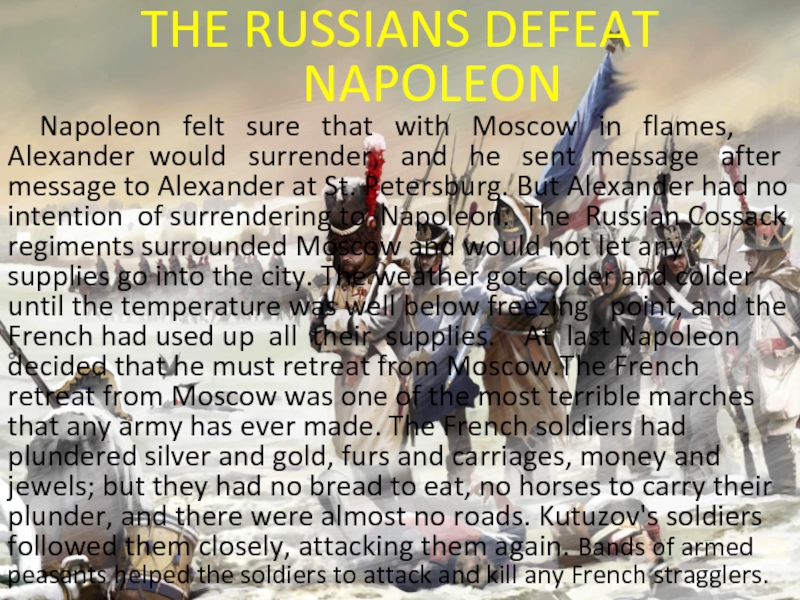
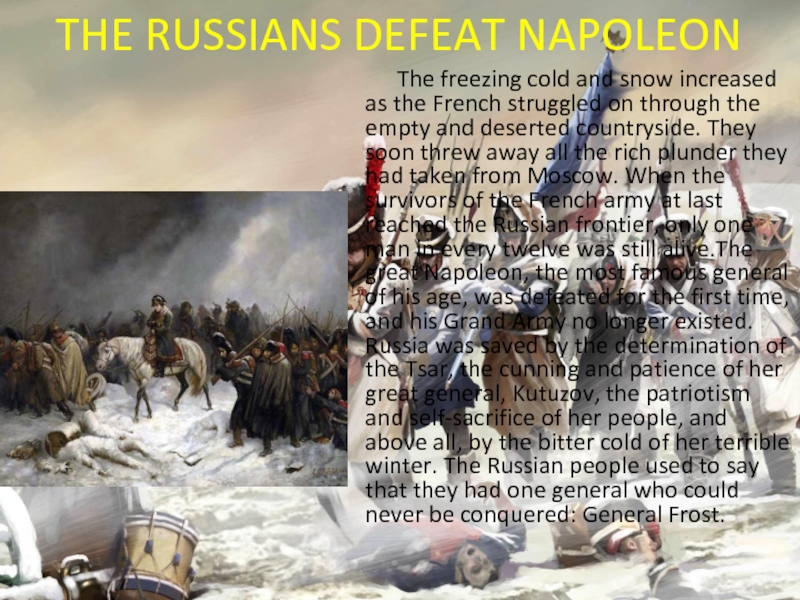
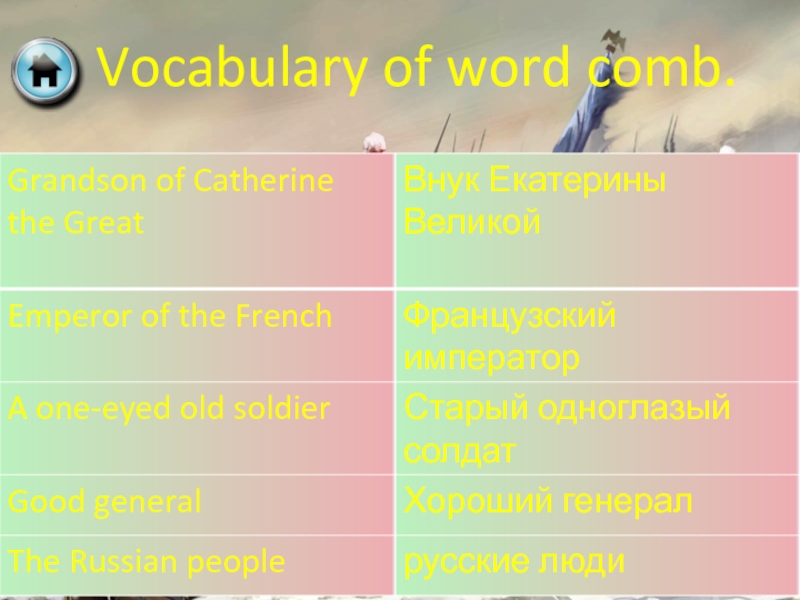
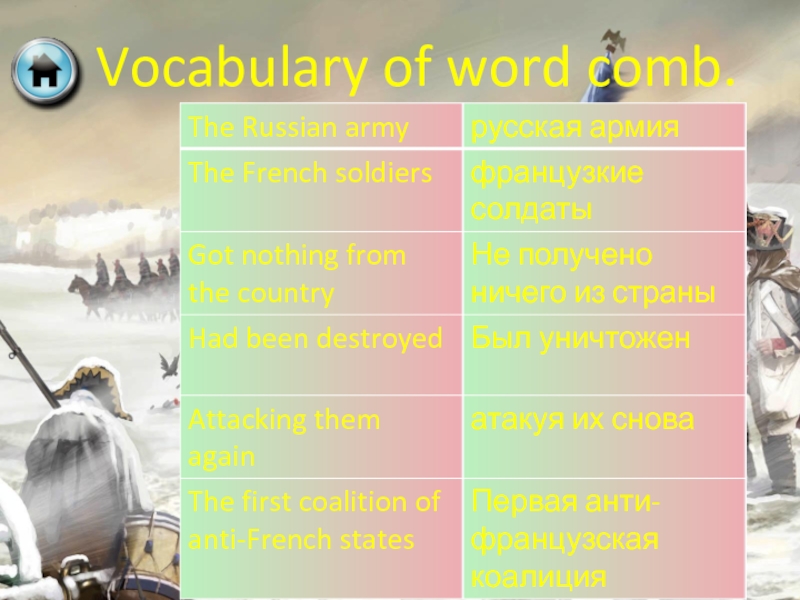
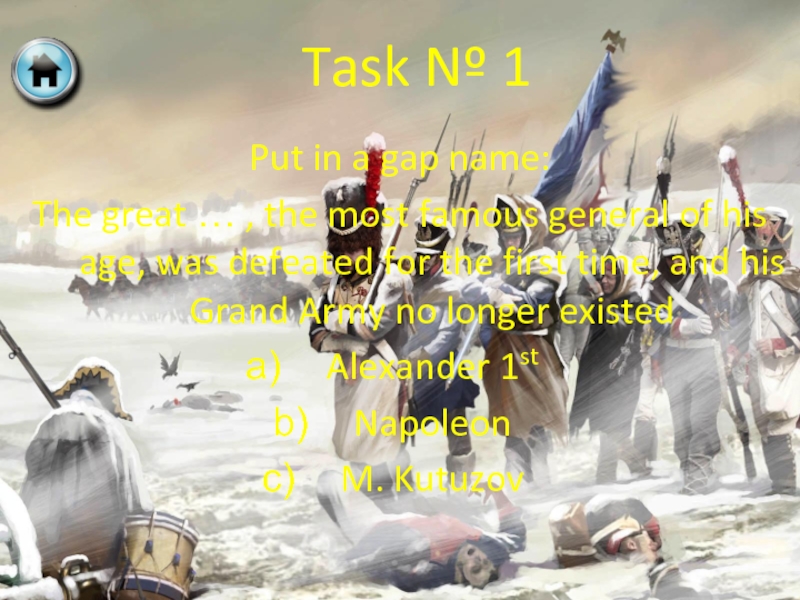
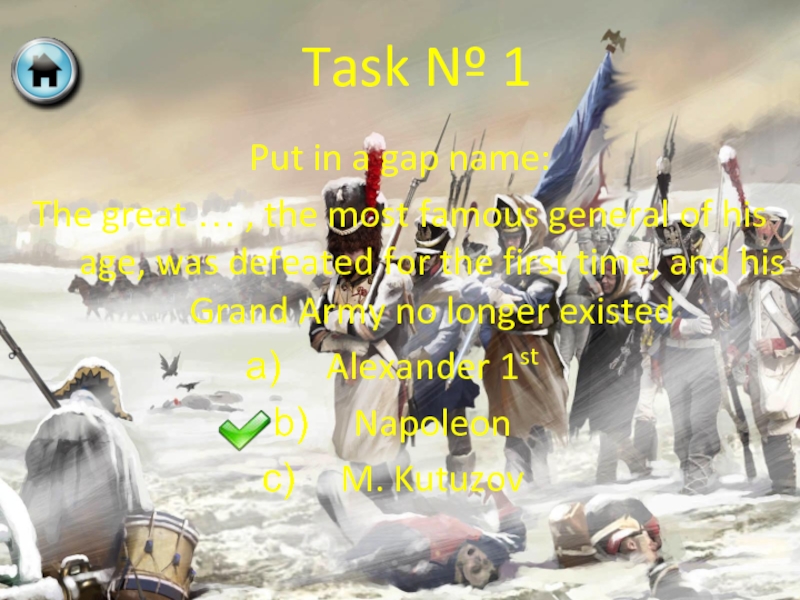
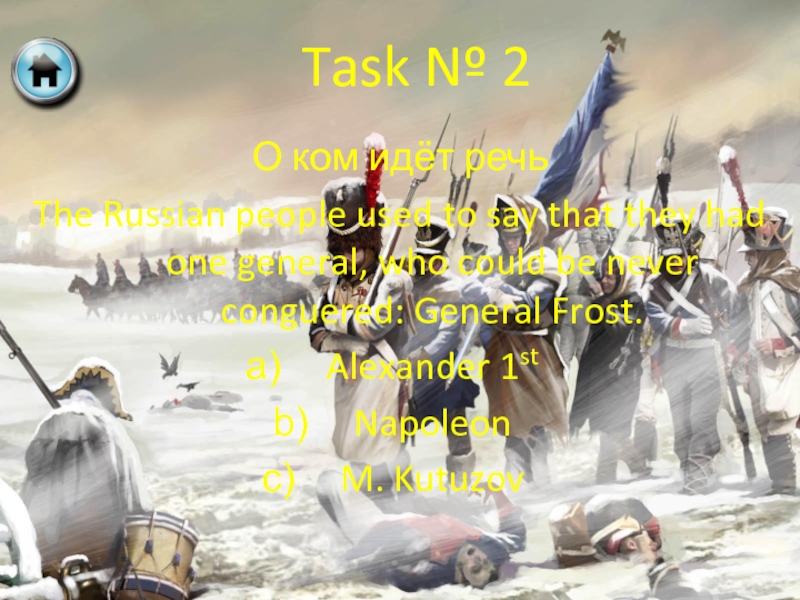
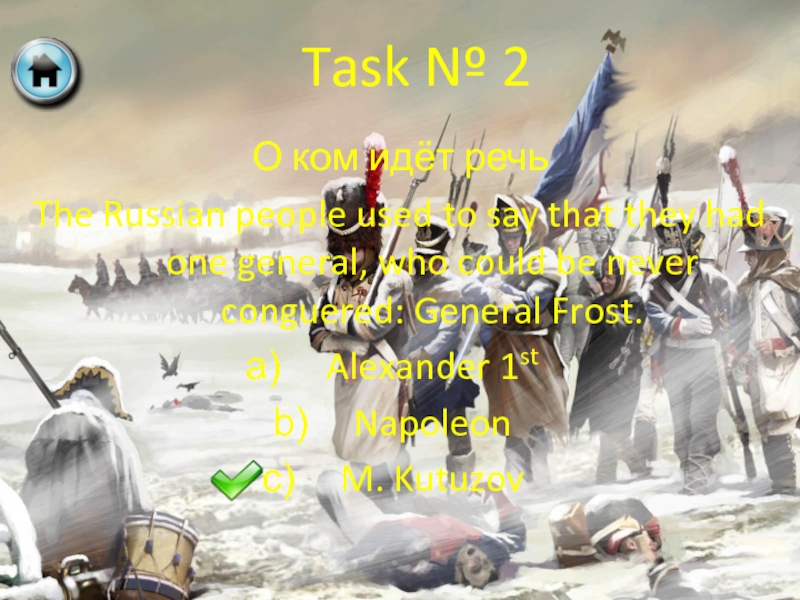
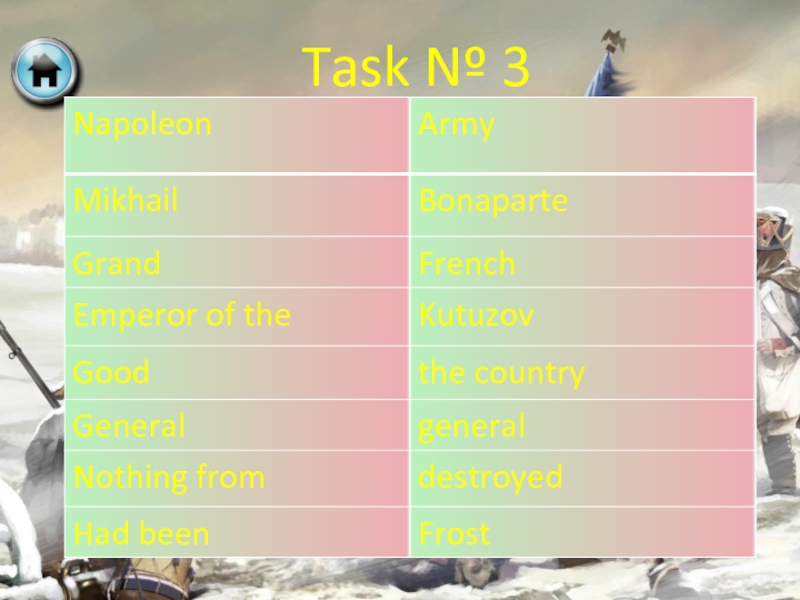
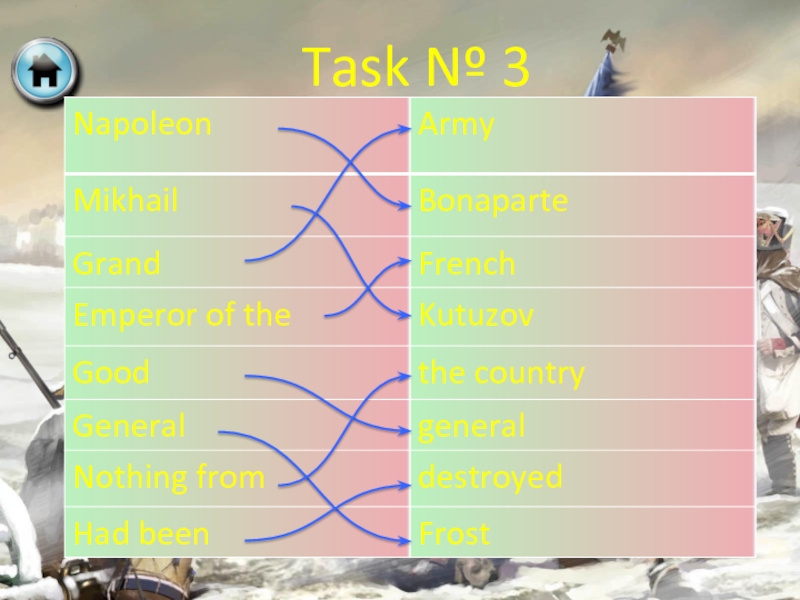
![Проект: Россия в войне с Наполеоном 1812 The Russian WarriorsMikhail Illarionovich Golenishchev-Kutuzov (Russian: князь Михаи́л Илларио́нович Голени́щев-Куту́зов; 16 The Russian WarriorsMikhail Illarionovich Golenishchev-Kutuzov (Russian: князь Михаи́л Илларио́нович Голени́щев-Куту́зов; 16 September [O.S. 5 September] 1745 –](/img/thumbs/c3ebb942368c35a8eca6c6c15cfa5d70-800x.jpg)
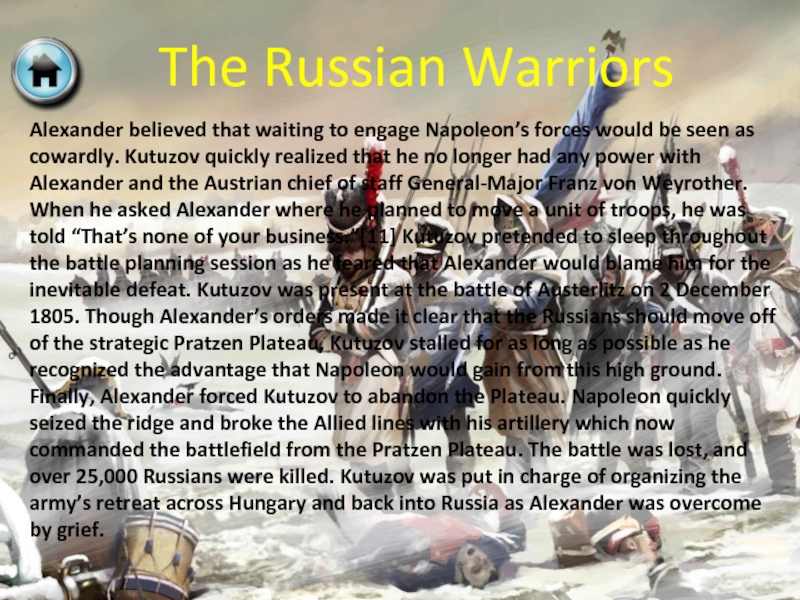
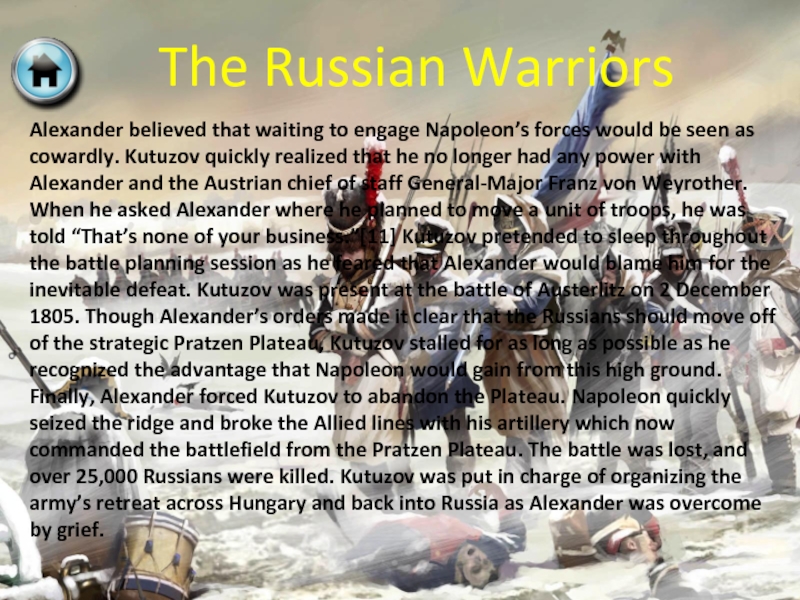
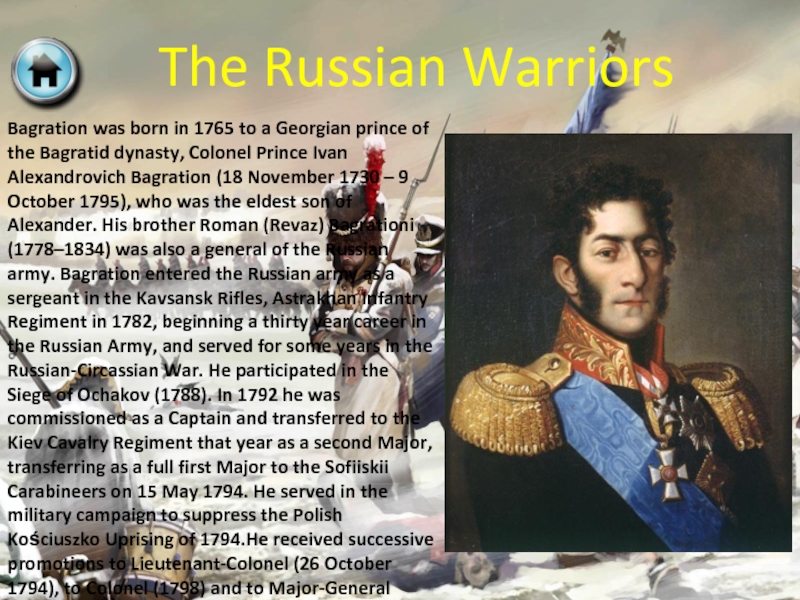
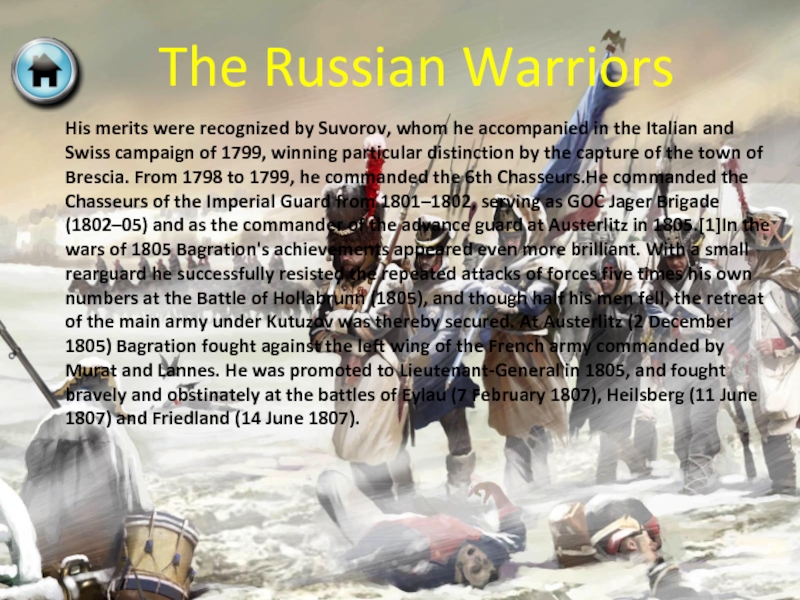
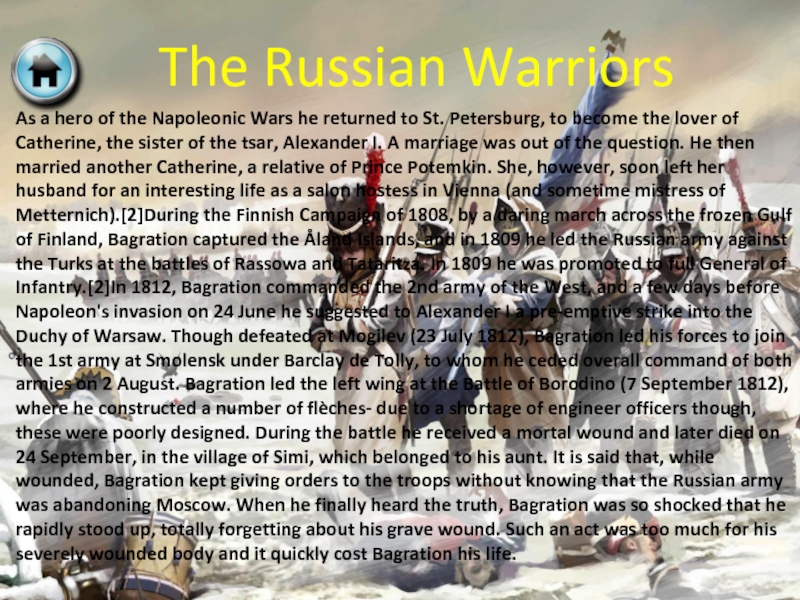
![Проект: Россия в войне с Наполеоном 1812 The Russian WarriorsPrince Michael Andreas Barclay de Tolly (27 December [O.S. The Russian WarriorsPrince Michael Andreas Barclay de Tolly (27 December [O.S. 16 December] 1761 – 26 May](/img/thumbs/922288e353ac9593bc738d1f481332a9-800x.jpg)
